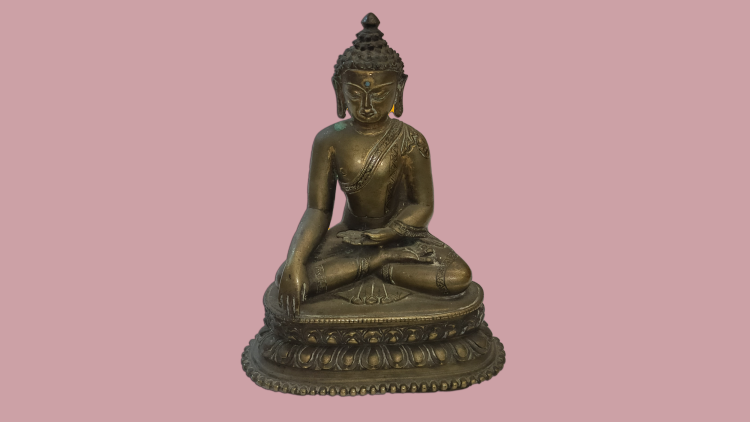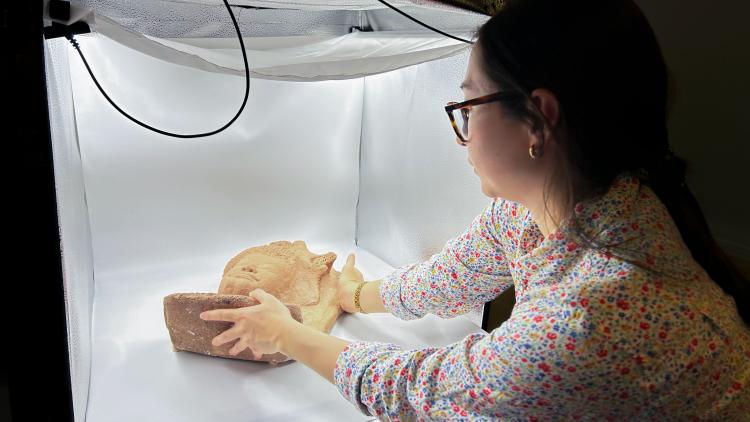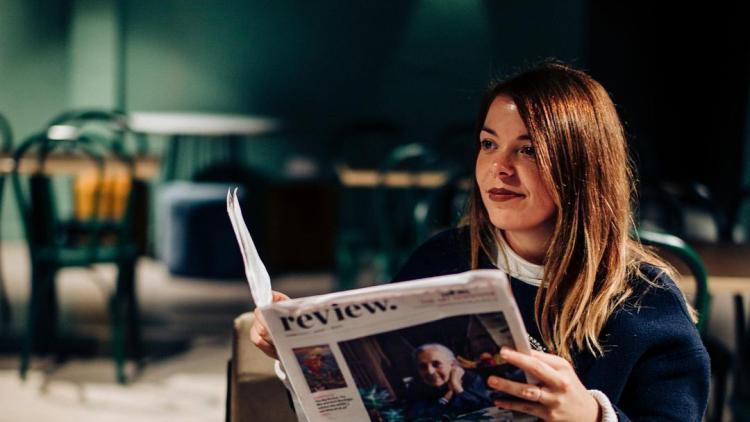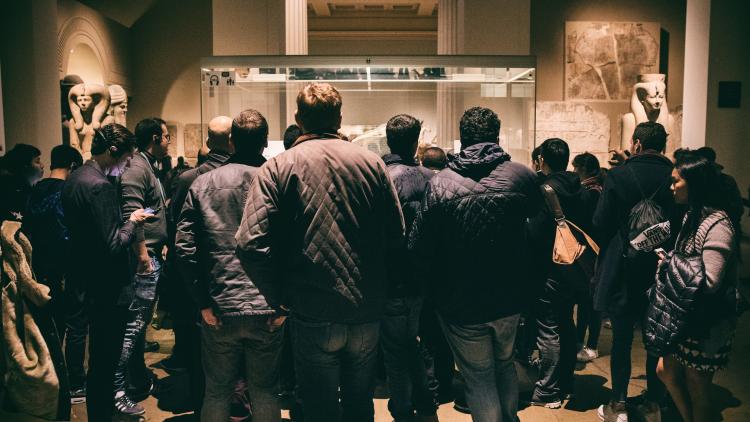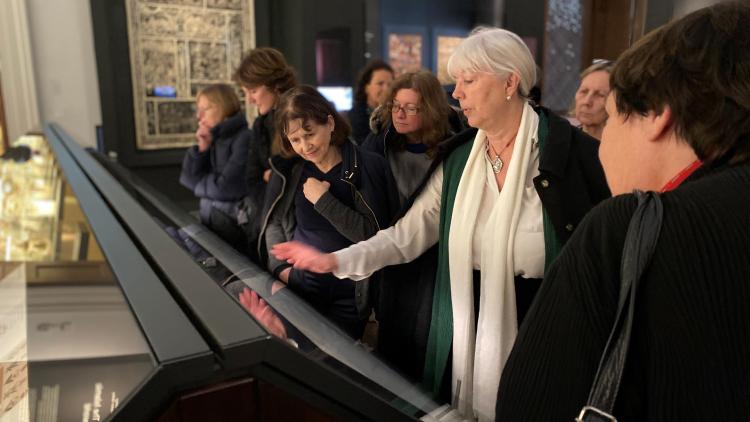BA History of Art
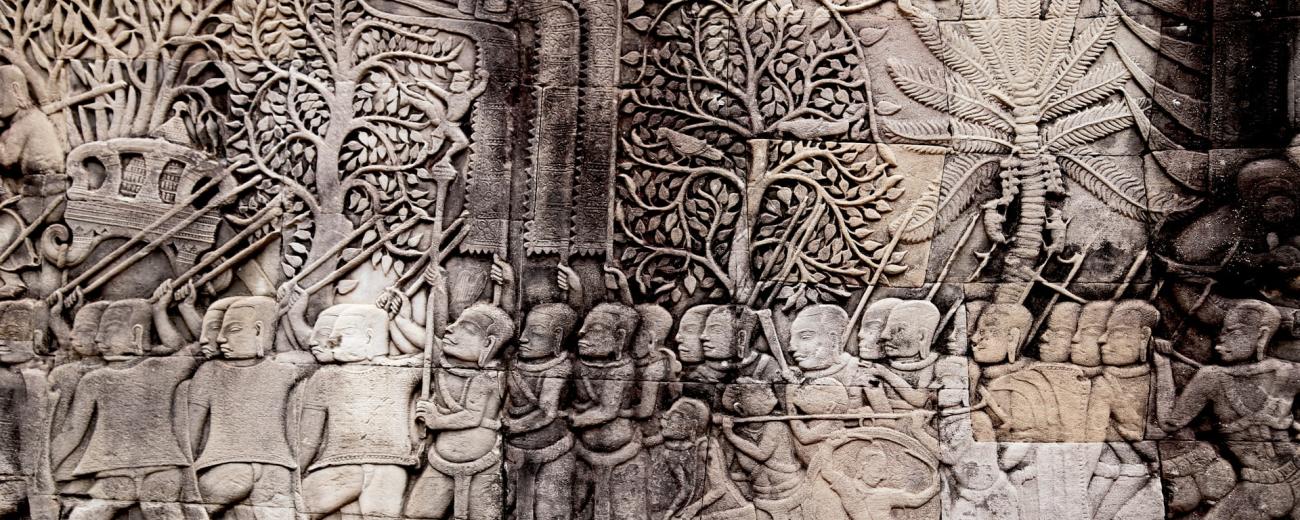

Key information
- Start date
- Duration
- 3
- Start of programme
- September
- Attendance mode
- Full Time
- Location
- SOAS on Campus
- Fees
-
Home student fees: £9,250
Overseas student fees: £21,990Please note that fees go up each year.
See undergraduate fees for further details. - Course code
- V350
- Entry requirements
-
ABB
Contextual: BBB
-
Austria: Reifeprufungszeugnis / Maturazeugnis: four subjects at 1, 2, 2, 2
A Level equivalent: ABB
Contextualised offer: BBB -
Belgium: Diploma van Secundair Onderwijs: 75% (7.5/10, 15/20) overall
A Level equivalent: ABB
Contextualised offer: BBBInformation for prospective students from Belgium
-
Bulgaria: Diploma za Zavarsheno Sredno Obrazovanie: 5.3 and 5.0 in two State Maturity Exams
A Level equivalent: ABB
Contextualised offer: BBB -
Canada: High School Diploma: 80% with 5 acceptable Grade 12 subjects (most territories).
British Columbia: AABBB in Grade 12 courses.A Level equivalent: ABB
Contextualised offer: BBBInformation for prospective students from Canada
-
China: Senior Secondary Graduation Certificate + Gaokao: 78% overall in Gaokao PLUS 85% overall in Senior Secondary School Graduation Certificate (year 11 and 12)
A Level equivalent: ABB
Contextualised offer: BBBInformation for prospective students from China
-
Croatia: Matura Certificate: 4.5 overall with 5 in 1 Higher level subject
A Level equivalent: ABB
Contextualised offer: BBB -
Cyprus: Apolytirion with 2 A-Levels: Apolytirion 18/20 + A-level grades BB
A Level equivalent: ABB
Contextualised offer: BBB -
Czech Republic: Matura Certificate: 1, 2, 2, 2
A Level equivalent: ABB
Contextualised offer: BBB -
Denmark: Studentereksamen; Hojere Forberedelseseksamen; Hojere Handelseksamen; Hojere Teknisk Eksamen: 7 plus 10, 7, 7 in three Level A subjects
A Level equivalent: ABB
Contextualised offer: BBBInformation for prospective students from Denmark
-
Estonia: Gümnaasiumi lõputunnistus with the Riigieksamitunnistus: 4.0 with 85%, 80%, and 80% in 3 state exams
A Level equivalent: ABB
Contextualised offer: BBB -
Finland: Ylioppilastukint / Studentexamen: four subjects at 6, 5, 5, 5
A Level equivalent: ABB
Contextualised offer: BBB -
France: French Baccalaureat or Option Internationale du Baccalauréat (OIB): 13/20
A Level equivalent: ABB
Contextualised offer: BBBInformation for prospective students from France
-
Germany: Abitur: 1.8
A Level equivalent: ABB
Contextualised offer: BBBInformation for prospective students from Germany
-
Greece: Apolytirion of Geniko Lykeio with Pan Hellenic exams: 18/20
A Level equivalent: ABB
Contextualised offer: BBBInformation for prospective students from Greece
-
Hong Kong: Hong Kong Diploma of Secondary Education: 544 in two electives and one core (all other subjects grade 3)
A Level equivalent: ABB
Contextualised offer: BBBInformation for prospective students from Hong Kong
-
Hungary: Matura (Erettségi): 4.5 overall
A Level equivalent: ABB
Contextualised offer: BBB -
Iceland: Stúdentspróf: 7.5
A Level equivalent: ABB
Contextualised offer: BBB -
India: Standard XII: 75% (CBSE, CISCE, Tamil Nadu, Maharashtra & West Bengal boards), 80% (all other state boards)
A Level equivalent: ABB
Contextualised offer: BBBInformation for prospective students from India
-
Ireland: Irish Leaving Certificate: H1, H2, H2, H3, H3
A Level equivalent: ABB
Contextualised offer: BBB -
Israel: Bagrut: Overall grade of 7, 80% with 3 subjects at 5-unit level
A Level equivalent: ABB
Contextualised offer: BBBInformation for prospective students from Israel
-
Italy: Diploma Consequito con L’Esame di Stato: 80% overall
A Level equivalent: ABB
Contextualised offer: BBBInformation for prospective students from Italy
-
Latvia: Certificate of General Secondary Education: 88% in four State subject exams
A Level equivalent: ABB
Contextualised offer: BBB -
Lithuania: Brandos Atestatas: 8.5/10 and 90%, 85%, 85% in three State Exam
A Level equivalent: ABB
Contextualised offer: BBBInformation for prospective students from Lithuania
-
Malta: Advanced Matriculation Certificate: AB (Advanced) + BBB (Intermediate)
A Level equivalent: ABB
Contextualised offer: BBB -
Netherlands: Voorbereidend Wetenschappelijk Onderwijs: 7.5 overall with 8, 8, 7, 7 in four subjects
A Level equivalent: ABB
Contextualised offer: BBB -
Norway: Vitnemål vidergaende opplaering: 4.3 overall
A Level equivalent: ABB
Contextualised offer: BBBInformation for prospective students from Norway
-
Poland: New Polish Matura: 75% in three Advanced Level subjects
A Level equivalent: ABB
Contextualised offer: BBBInformation for prospective students from Poland
-
Portugal: Diploma de Ensino Secundario: overall 17.5/20
A Level equivalent: ABB
Contextualised offer: BBB -
Romania: Diploma de Bacalaureat: 8.5 overall
A Level equivalent: ABB
Contextualised offer: BBBInformation for prospective students from Romania
-
Singapore: Polytechnic Diploma (Nanyang, Ngee Ann, Singapore, Temasek and Republic Polytechnic): GPA 3.3
A Level equivalent: ABB
Contextualised offer: BBBInformation for prospective students from Singapore
-
Slovakia: Maturitná skúška / Maturita / Vysvedčenie o maturitnej skúške: four subjects at 1, 2, 2, 2
A Level equivalent: ABB
Contextualised offer: BBB -
South Africa: National Senior Certificate: 77666
A Level equivalent: ABB
Contextualised offer: BBBInformation for prospective students from South Africa
-
Spain: Curso de Orientación Universitaria / Título de Bachillerato: 7.5
A Level equivalent: ABB
Contextualised offer: BBBInformation for prospective students from Spain
-
Sweden: Slutbetyg / Examensbevis från Gymnasieskolan: A in 1200 credits and no grades below D / 18 / mainly B overall (MVG/VG)
A Level equivalent: ABB
Contextualised offer: BBB -
Switzerland: Federal Maturity Certificate: 4.5
A Level equivalent: ABB
Contextualised offer: BBB -
Tanzania: Advanced Certificate of Secondary Education: ACSE with BBB in 3 principle subjects
A Level equivalent: ABB
Contextualised offer: BBB -
Trinidad and Tobago: CAPE: Six CAPE units with grade 2 (+two double-unit courses)
A Level equivalent: ABB
Contextualised offer: BBB -
Turkey: Lise Diplomasi: 78-83% (depending on high school)
A Level equivalent: ABB
Contextualised offer: BBB -
USA: High School Diploma plus ACT, SAT, or AP exams:
-
High School Diploma GPA 3.0 plus SAT 1280 or ACT 27 and 2 AP's at 4,4
or -
High School Diploma GPA of 3.2 plus 2 AP's at 4,4
or -
High School Diploma GPA 3.4 plus SAT 1300 or ACT 29
or -
2-year Associate degree GPA 3.1
A Level equivalent: ABB
Contextualised offer: BBB -
-
See undergraduate entry requirements and English language requirements for international and alternative entry requirements.
Course overview
The BA History of Art programme is an unrivalled opportunity to study the visual arts, architecture and material culture of Asia, Africa and the Middle East.
The History of Art and Archaeology department has world leading experts in Asian and African art history and archaeology, whose ground-breaking research informs and is informed by their teaching.
In the first year, you will be introduced to the art and archaeology of different regions. You will also receive theoretical and methodological training to prepare you for the study of Asian and African art. In years two and three, students broaden and deepen their knowledge and have the chance to specialise in particular regions or themes. An emphasis is placed on training students in visual analysis, through the close study of images and objects. You are also provided with a critical introduction to the creative and cultural industries.
Students benefit from the unparalleled knowledge and enthusiasm of staff. As members of the School of Arts, they profit from the insights of scholars and students studying the Music, Film and Media of Asia, Africa and the Middle East in historical and contemporary contexts. You can also select from modules in other departments, taking advantage of SOAS’s unrivalled expertise in the languages, history, religions and cultures of Asia and Africa.
Why study History of Art at SOAS?
- SOAS is ranked 15th in the UK for Arts and Humanities (QS World University Rankings 2023).
- We have a 100% overall student satisfaction (NSS 2022).
Structure
The structure of modules reflects the importance given to conceptual clarity, methodological rigour and the independent interests of students. Special emphasis is placed on the exploration of arts and artefacts as evidence in historical, religious and cultural studies of societies and cultures, and particular importance is given to enhancing students' visual analysis skills.
One purpose of the introductory year is to provide a basis for the student's selection of modules in the second and third years. The selection of modules in the third year is normally intended to develop the chosen specialisations of the second year. In addition, all third-year students are required to write an Independent Study Project essay (on a subject of their choice) which counts as 30 credits.
Occasionally the availability of optional modules changes as a result of staffing and other circumstances. Students who had signed up for such modules will be notified as soon as possible and given the opportunity to choose from available alternatives.
Year 1 - Core and Compulsory
Year 1 - Guided options
Up to 30 credits or Language
Year 2 - Core and Compulsory
Year 2 - Guided options - List A
List A or B (6x15 credit modules), depending on odd/even year
Year 2 - Guided options - List B
List A or B (6x15 credit modules), depending on odd/even year
Year 3 - Core and Compulsory
Year 3 - Guided options - List A
List A or B (6x15 credit modules), depending on odd/even year
Year 3 - Guided options - List B
List A or B (6x15 credit modules), depending on odd/even year
Teaching and learning
All first year modules involve a weekly lecture and tutorial. In the second and third year, a seminar may replace the lecture.
For most modules, assessment involves course work and an unseen examination.
- Year 1: course work entails short, concentrated pieces of work.
- Year 2 and 3: course work emphasis shifts to longer papers.
- In the final year: students are required to complete an independent study project on a subject of their choice.
Materials
SOAS is exceptional in the regional expertise it offers with regard to languages and literatures, religious studies, history and anthropology. Students have access to an unrivalled range of art-historical and archaeological resources:
- Main Library of the School
- The Courtauld Institute
Contact hours
All full-time undergraduate programmes consist of 120 credits per year, in modules of 15 credits. They are taught over 10 weeks. The programme structure shows which modules are compulsory and which optional.
As a rough guide, 1 credit equals approximately 10 hours of work. Most of this will be independent study. It will also include class time, which may include lectures, seminars and other classes. Some subjects, such as learning a language, have more class time than others. In the School of Arts, most undergraduate modules have a one- or two-hour lecture or seminar every week. Some, but not all, also have a 1-hour seminar or tutorial every week.
SOAS Library
SOAS Library is one of the world's most important academic libraries for the study of Africa, Asia and the Middle East, attracting scholars from all over the world. The Library houses over 1.2 million volumes, together with significant archival holdings, special collections and a growing network of electronic resources.
Fees and funding
Fees for 2023/24 entrants per academic year
| Programme | Full-time | |
|---|---|---|
| Home students | Overseas students | |
| BA, BSc, LLB | £9,250 | £21,160 |
| BA/BSc Language year abroad | £1,385 | £10,580 |
Please note that fees go up each year.
See undergraduate fees for further details.
Employment
Students in the School of Arts develop a critical and theoretically informed approach to global arts and culture. In addition to an intercultural awareness and practical expertise, graduates gain a wide portfolio of transferable skills which are especially sought after in the creative and cultural industries.
Recent graduates have been hired by:
- Christie’s
- Christine Park Gallery
- Crisis
- Design Museum
- Hong Kong Museum Of Art
- India Foundation For The Arts
- Japanese Gallery
- Museum of East Asian Art
- Music in Detention
- National Gallery
- Pan Arts
- People Projects Culture & Change
- Roundhouse Trust
- Somerset House Trust
- Songlines Magazine
- Sotheby's
- South Asian Art UK
- Stratford Circus Arts Centre
- Taiwan Embassy
- The Alliance for Global Education
- The British Embassy
- The National Museum Of Korea
- The Royal Collection
- Victoria and Albert Museum
Find out about our Careers Service.


